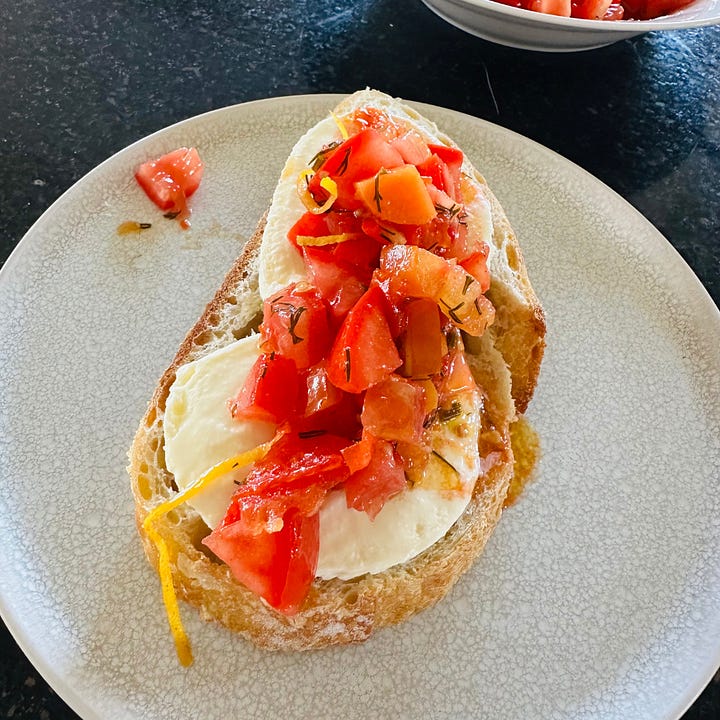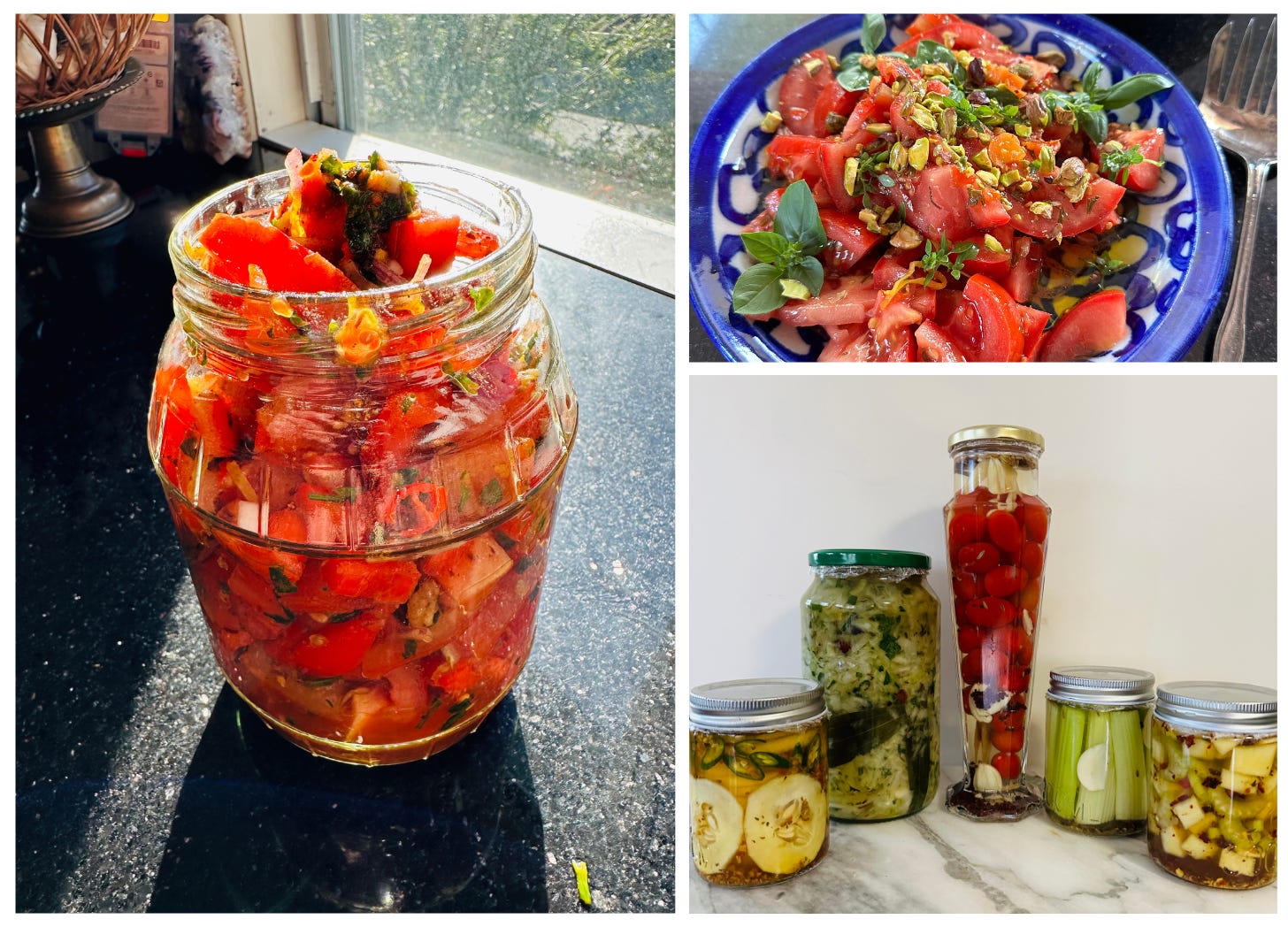GUT Friendly Ferments
Fermentation magic: The Health Benefits and Potential Risks of Fermented Foods?
Lately, I've been diving deep into the world of fermentation, and my kitchen has become a little fermentation hub! From bubbling jars of sauerkraut and spicy fermented chilies to tangy pickled cherry tomatoes and a delightful tomato relish inspired by
, I've been experimenting with some fun creations. It got me thinking, fermentation is one of the oldest methods of food preservation, yet it's still incredibly relevant in our kitchens today. Not only does it give us those bold, unique flavours, but fermented foods also come with a whole array of health benefits. Of course, there are a few things to be mindful of, but we’ll get to that!Let’s take a closer look at why fermented foods are so good for us, and I’ll share a few tips I’ve picked up along the way.
What Exactly is Fermentation?
Before we get into the benefits, what actually is fermentation? Simply put, it’s the process where naturally occurring bacteria or yeasts break down sugars in food, producing acids, gases, or alcohol. This transformation gives us deliciously tangy and savory flavours while helping preserve our food. Fermentation can be done with almost anything—veggies, fruits, grains, dairy, and even meats! Think of foods like sauerkraut, kimchi, yogurt, kombucha, and, yes, even your favourite sourdough bread. All of these are fermented to some degree.
Why Should You Add Fermented Foods to Your Plate?
There’s a reason fermented foods are having such a moment right now—they’re amazing for your health! Here are a few reasons why your gut (and more) will thank you:
1. Gut Health Superstars
Fermented foods are loaded with probiotics, those good bacteria we hear so much about. These probiotics help balance your gut microbiome, which is key to good digestion. They also keep harmful bacteria in check, so you’re less likely to experience bloating, gas, or other digestive issues.
2. A Boost for Your Immune System
Did you know that about 70% of your immune system is actually located in your gut? By nourishing your gut with probiotic-rich fermented foods, you're giving your immune system the support it needs to fight off infections. A happy gut = a happy immune system!
3. Better Nutrient Absorption
Fermentation enhances the bioavailability of many nutrients. For example, sauerkraut and kimchi can help your body better absorb vitamins, especially B vitamins, and minerals like magnesium. When your gut is in good shape, it absorbs nutrients more efficiently, which means you're getting the most out of your food.
4. Metabolic and Heart Health
Studies show that fermented foods, particularly fermented dairy like yogurt and kefir, can improve insulin sensitivity and reduce the risk of heart disease. They can also lower blood pressure and cholesterol levels—another win for your body!
5. Food for the Soul (and the Mind)
There’s a growing body of research showing that fermented foods can positively affect your mental health. Thanks to the gut-brain connection, a healthy gut can lead to a clearer mind, less anxiety, and even improved mood. This is something I’ve noticed personally, too—fermented foods really do make me feel good from the inside out.
What to Watch Out For: The Risks of Fermented Foods
Of course, with every good thing comes a few caveats, and fermented foods are no exception. While they bring tons of benefits, there are a couple of things you should keep in mind:
1. Histamine Sensitivity
Some fermented foods—especially things like aged cheeses, fermented meats, and even some pickled veggies—can be high in histamine. If you're sensitive to histamine, this can trigger headaches, itching, or even digestive issues. If you've noticed these symptoms, try limiting high-histamine foods and see how you feel.
2. Too Much Salt
Many fermented veggies, like pickles and sauerkraut, can be high in salt. While a little bit can be great, you don’t want to go overboard, especially if you have high blood pressure or need to watch your sodium intake. Some people like to rinse their sauerkraut before eating it to remove some of the excess salt, but I’d only suggest this if you are on a low salt diet recommended by your physician, otherwise just reduce your portion size.
3. Risk of Contamination
It’s crucial to make sure your fermentation process is done correctly, as improper fermentation can lead to harmful bacteria. If you're doing it at home (which I highly encourage—it's so satisfying!), always keep everything clean, use fresh ingredients, and follow safe fermentation guidelines.


Getting Started with Fermentation
If you’ve never tried fermenting at home, it’s easier than you think! Start with something simple like a batch of sauerkraut or pickles. All you need is fresh produce, salt, and some clean jars. Once you see those bubbles forming, you'll be hooked. And remember, don’t be afraid to experiment—mix in different herbs, spices, or even fruits to create new flavour profiles. My fermented cucumber and celery mix was a random experiment that turned into a new favourite!
Sam Coopers post on Quick fermented relish is a winning recipe, which I’ve experimented with and found on high rotation on my plate since reading his post, this is a great place to start if you are new to fermentation, its quick and easy and packs a punch of flavour and versatility in the kitchen. Just this week I’ve used a couple of tablespoons of left over fermented tomato salad as a base for a Korean inspired sauce for a tuna steak, which was then repurposed last evening as a base for a marinade for pork spare ribs bound for a Korean miso stew.
Fermentation truly is a magical process. Not only does it help preserve food, but it also brings a wealth of health benefits to your diet—supporting your gut, your immune system, and even your mental health. Just remember to enjoy it in moderation and be mindful of those few risks if you are sensitive. Whether you're a seasoned fermenter or a newbie looking to get started, there’s always something new to discover.
Have you tried fermenting at home? What’s your favourite fermented food? Let me know in the comments, and don’t forget to subscribe to Spice Chronicles for more stories, recipes, and spice adventures!
Happy fermenting!
Copywrite ©Lisa McLean 2025










Thank you, Lisa, for this wonderful newsletter. I truly love fermenting, and your right, once you start fermenting the possibilities are endless.
Thank you Karen, I appreciate your support.